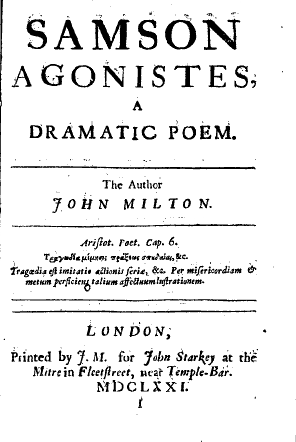
Poetics. The Greek epigraph comes from Aristotle's Poetics, Chapter 6. "Tragedy is an imitation of an action, etcetera." Aristotle's comments on tragedy were considered prescriptive by many. See Poetics 1449b-1456b. The Latin translation is a fuller quotation: "Tragedy is an imitation of the life actions, etcetera. Through pity and fear effecting the release of these emotions."
M D C L X X I. Samson Agonistes appeared in 1671, published in the same book with with Paradise Regain'd. The title page of Paradise Regain'd reads in part "Paradise Regain'd . . . to which is added Samson Agonistes." Arguments about the date of composition tend recently to favor a later date, close to the publication, though like Paradise Regain'd, the poem may have been started much earlier. Agonistes means both an actor and a combatant or struggler. The story is based on the biblical narrative of Samson in Judges 13-16.





